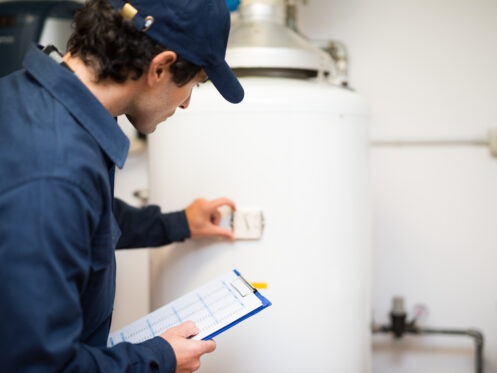Tank water heaters are the traditional choice to provide hot water to American homes. Tankless water heaters aren’t a new invention, but the technology has come a long way in recent years. Those innovations have made on-demand water heaters one of the hottest trends in home improvement. To determine if it’s the right choice for you, let’s explore the pros and cons of this configuration.
Short-Term vs. Long-Term Costs
Tankless water heaters are generally more energy efficient than their tank counterparts. The daily operating costs will be less, and those savings can be significant over the life of the equipment.
How much more efficient are they? It depends on how much hot water your household uses. For homes that use 41 gallons or less, which is about average, the savings will be between 24% and 34%. If you use around 86 gallons a day, which is an outlier, the energy savings will be about 8% to 14%. It’s still worthwhile in that case, but it will take you longer to recoup your investment.
The initial investment is an important consideration because the costs can be substantially higher. You can expect your equipment and installation costs to be at least 25% greater. For an initial install, there can be additional requirements that drive the price up even more. You won’t have to pay those costs with subsequent replacements, but they can make a big difference now.
Whether a tankless system is worth it for many homeowners comes down to costs now versus costs later. The tankless system will save you money, but it may be a decade or more before you see those savings.
Fuel Source or Electricity
Fuel and power costs are a consideration as well. Fuel-burning water heaters are typically more economical. With a tankless system, electric can be more economical in certain scenarios, such as small homes with low hot water demand. With a fuel-burning system, your equipment costs will be higher, but you’ll make that added cost up over time.
Natural gas is the preferred fuel source, but you need access to a natural gas line. If you already have connections, that isn’t much of a consideration. If you have access but no connections, the conversion will be an additional cost. If you have no access, propane is the main alternative. There can be additional costs there as well, such as putting in a tank and hooking it up.
Electrical Panel Upgrade
All fuel-burning tankless water heaters required an electrical connection. This isn’t the case with tank water heaters. It actually powers the ignition system, so the power demand is significant. This is also means that during a power outage, you’ll be without hot water without a standby generator.
It surprises many homeowners to learn that they need an electrical panel upgrade for a tankless water heater. If you live in a home built before 2020, experts recommend scheduling an electrical inspection. You may need to deal with bringing your system up to code first before moving on to this upgrade.
Water Hardness
Another important consideration is water hardness, which refers to the mineral content in your water supply. Hard water is bad for all water heaters. It’s the reason tank systems have sacrificial anode rods and require annual flushing. Hard water is even worse for tankless systems and can significantly shorten their lifespans. Water hardness is a concern when it’s 7 grains per gallon (GPG) or higher. If you have hard water, there are two main solutions. The cheapest option is an anti-scale device for the water heater. The more expensive but more comprehensive option is a whole-house water softening system. Even with these upgrades, you’ll want to schedule annual descaling of your system.
Limited or Virtually Limitless Hot Water?
We’ve explored some of the potential challenges. Now, let’s shift focus to the pros. A tank water heater provides a finite amount of hot water. If you run out, you’re out until the system heats more.
With a tankless system, you’ll never really run out. You may deal with low hot water pressure, but even then, you can reduce your points of usage to restore the hot water supply. That makes an on-demand system much more forgiving.
Extra Capacity
A tankless system also makes it much more practical to purchase extra capacity. Consider a household with adult children that are only home from college at various periods during the year. With a tankless system, you can purchase enough capacity to accommodate them. It will cost you more up front, but it’s not an upgrade you’ll be paying for wastefully over time. This isn’t the case with a tank water heater. If you purchase a 75- rather than 50-gallon tank, you’ll be paying for that every day. It’ll cost you a lot more over the life of the system.
Considerations for Large Houses
Sizing a tank water heater requires determining the highest flow rate you’ll need at any one time. In a large house, it may be necessary to achieve that flow rate through two or more water heaters rather than just one. This also overcomes the problem of a water heater being too far from a fixture. This will increase your initial cost substantially but is cost-effective over the life of the system.
Installation Footprint
On-demand water heaters take up considerably less space. You can install them in attics, and if you choose your garage, they don’t cut into your storage area. Tank water heaters take up a lot of space. Many homes have closets dedicated to them you can repurpose. Even if you have one of those tall units, the tankless system will free up a lot of area in a garage or basement.
Warranties and Extended Warranties
Longer lifespans are another reason that tankless water heaters are often the better long-term value. The warranties reflect this, and they often provide better protection, as there are fewer parts that can go bad. Six-year warranties are typical with tank systems. You can often extend them to 12 years. Many tankless systems come with 15 years or more of coverage. There are even some brands that offer 25 years.
Rebates and Tax Credits
Rebates and tax credits are an opportunity to offset your initial costs and make the upgrade more affordable. For the tax credit, you’ll need to choose a natural gas or propane system. For both tank and tankless systems, the credit is 30% up to $600. As for rebates, providers often limit them to tankless systems. You’ll need to target models with ENERGY STAR certification. You should also check with your local utility companies. They’re the most common source of such rebates.
Would You Like to Upgrade to a Tankless Water Heater?
If you’d like to install a tankless water heater in Salida or the surrounding areas, Loves Air can help. We’re also an HVAC company that installs and repairs all manner of heating and cooling systems. We perform HVAC maintenance also and have maintenance plans available to help you save. Our team installs and services whole-house fans. We can also improve your home’s energy efficiency through programmable and smart thermostats, duct sealing, window replacement and solar panels. To schedule a water heater appointment or if you have questions, call us today, or reach out to us online.



